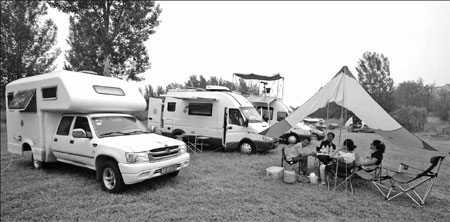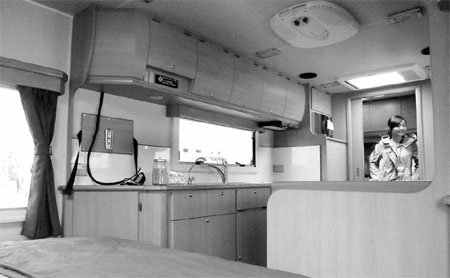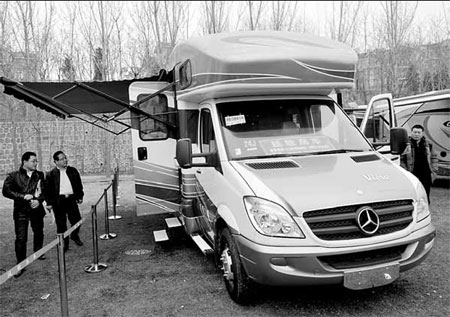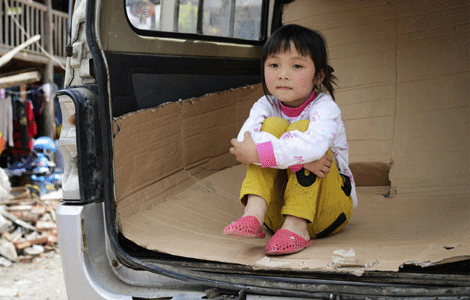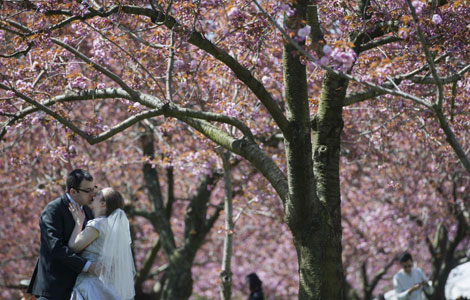A camper's life traveling the open road
Updated: 2013-04-29 07:56
By Shi Jing in Shanghai (China Daily)
|
||||||||
|
Travelers recharging their RVs at a camping park in Beijing. Enthusiasts say there is little better than packing their bags, loading up with supplies, and heading off wherever the road takes them. Zhao Guangxia / for China Daily |
|
Inside a recreational vehicle, or RV, on show during a recent auto fair in Nanjing, the capital city of East China's Jiangsu province. With soft furnishings, tapped water, washroom and cooking facilities all onboard, many of the vehicles are literally mobile homes. Wang Luxian / for China Daily |
|
A recreational vehicle on show during an exhibition in Beijing. With rising demand for the vehicles in China, experts expect more of these kinds of event in future. Li Wenming / for China Daily |
Bored of your current life? Desperate to get away from the city? Feel like a change of scenery? Or looking for just a completely new start altogether?
Of course, all the above require equal amounts of money, time and courage.
But how about this for a temporary solution, at least?
Try getting away from reality, in your own mobile home, or camper van, or to be technically correct, your own "recreational vehicle".
The market for campers is growing fast in China, as more people realize that owning their own can mean all the pleasures of enjoying whatever new surroundings you want, without the trouble of having to relocate.
Shi Qiangqiang, marketing manager of Star Coach China, a leading supplier of vehicles, says the numbers of people doing just that are rising.
He has customers from China and from the United States, and the majority of buyers are individuals, spending on average 1.78 million yuan ($286,000) on a vehicle.
"We have been operating in China for 10 years, but we saw the biggest growth in 2011, when we made profits of 800 million yuan," he said, adding that some wealthy Chinese are now more likely to spend their hard-earned cash on a camper, than a sports car or SUV.
"I think buying one of those two shows a very poor understanding of a relaxed lifestyle - it's nothing but showing off.
"With a camper you have so many more interesting options. You can customize the vehicle in whatever way you want.
"You can hit the road when you like - there is no more relaxing a form of travel."
Wang Jidong, the general manager of Beijing Camper RV Co, has been selling them for 11 years, and he too says he's never seen sales growth like today.
He's a camper enthusiast himself, adding there is no better way to connect with the countryside than packing up and heading out of town.
Once you try traveling in one, he says, you will be hooked: "You'll never get the same pleasure out of a sedan."
The proud owner of a domestically produced Naveco camper, the 35-year-old Wang is also a lover of the great outdoors.
He says his camper has become even more important to him, since his first daughter arrived just over a year ago.
"If we had a sedan, the room would be very limited.
"Children easily get bored and tired and so can adults after sitting in the same position for too long.
"But in a camper, you can sit on a sofa, drink freshly brewed coffee, go to the restroom and change diapers. You can even take a shower," added Wang.
"Imagine trying any of those in a normal car.
"Traveling by camper is fun, no matter the distance."
Wang says most of the camper-owners he knows are 35 to 50-year-old, successful people who come from all walks of life.
He sums up the typical camper driver as a "rich second-generation dad" who would consider buying a fast sports car a waste of money.
Another interesting feature, and less expected one, of life in a camper is that it can help facilitate communication between family members, Wang adds.
"Modern life is filled with so much hustle and bustle, many couples and families can go days without bothering to speak to each other," he said.
But life on the road means there is no excuse not to talk, given you are living under a far smaller roof, "with different wonderful views outside, maybe even some birds chirping", he adds.
"Life is everywhere around you, you know," he laughs.
According to Wang, 80 percent of campers are used by families for household outings.
"The camper industry went through explosive growth in 2011, and there's no reason to doubt that pace of growth will continue over the next two or three years," he says.
According to Beijing Recreational Vehicle Center, camper numbers in China reached 10,000 at the end of last year, compared to 6.5 million, 9.6 million and 80,000 in Europe, the United States and Japan respectively.
There are many more campsites too in those markets.
In the 2009 document, Opinions of the State Council on Accelerating the Development of Tourism Industry, campers were listed as among the country's more potentially popular leisure items of the future, as the population continues to increase their personal spending.
In the Outline of National Tourism and Leisure (2013-2020), published in February this year, the General Office of the State Council underlined that construction of campsites would receive government support.
At the end of 2012, the local governments of Jiangsu, Zhejiang, Anhui and Shanghai signed a Yangtze River Delta region camper travel outline, which detailed five ideal routes for camper travel, with two more now being planned.
The outline also highlighted that a network of 250 camper service stations will be established by the end of 2020 in the regions, by which time there will be 400 to 500 campsites.
"At present, there are more camper users in the northern part of China than in the south," said Wang.
"In the south, people can easily access green open spaces without the need for a camper - there might even be some outside their backdoors.
"But in the north, due to weather conditions, people have fewer chances to enjoy the outdoors," he said, adding that the Yangtze Delta region is particularly enjoyed by camper owners from all over the country.
Sun Jiandong, a 30-year old graduate in tourism administration who has been working in the outdoor sports industry for about seven years, has also witnessed the growth in the camper industry, especially in the Yangtze River Delta region.
He says there are still too few campsites in China and most have poor facilities.
"But I am sure the industry will catch up with other international markets soon. The overseas camper industry has a history of more than 100 years. We cannot seek growth overnight. We have to do it step by step," he said.
As well as more dedicated campsites, Sun says some of the country roads that users like to travel on are very poor.
He added more laws and regulations are needed to ensure safety standards are maintained in the industry, particularly on where campers can drive and park-up.
He would like to see closer scrutiny on the types of modifications being made to campers, clearer restrictions on how many people can travel within a vehicle, and what kind of license is needed to drive different sizes of vehicle, for instance.
And he said that being able to drive a 6-meter vehicle, capable of carrying seven people, using just a C-class driving license, the same as an ordinary sedan, is a problem that needs to be addressed.
"Traditional forms of travel are so tiresome and boring compared to traveling in a camper," said Sun.
"Tourists are so often taken to places, dropped off after long journeys, and that's about it. But travel should not be this way.
"I do hope that with the further development of the camper industry in China, people can really start to see places in a much more relaxed and natural way," he said.
shijing@chinadaily.com.cn
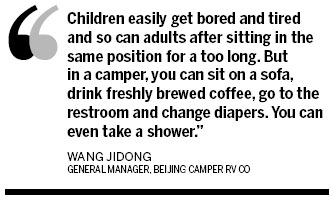
(China Daily 04/29/2013 page9)
Most Viewed
Editor's Picks

|

|

|

|

|

|
Today's Top News
Chinese NGOs reach out to African countries
Abe defends shrine visits
Premier Li: 'High alert' to remain on bird flu
China to enhance ties with Argentina
Technology fair eyes innovation
'Wang-Koo meeting' anniversary marked in Taipei
China joins rush for Mars
A camper's life traveling the open road
US Weekly

|

|
